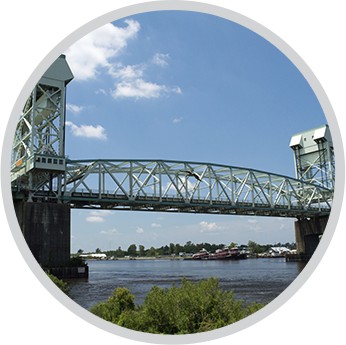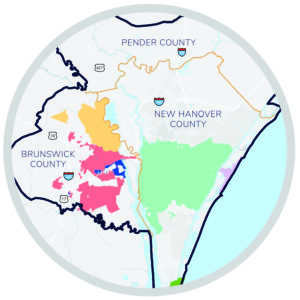
Get to Know the WMPO
The Wilmington Urban Area Metropolitan Planning Organization (WMPO) was created in 1973 when our region reached a population density threshold of 50,000 people to constitute the federally-mandated creation of a Metropolitan Planning Organization (MPO). As a federally-mandated and federally-funded entity, the Wilmington MPO is tasked with providing a regional and cooperative transportation planning process that serves as the basis for the expenditure of all federal transportation funds in the greater Wilmington area. The WMPO is required to prepare long range transportation plans for the planning area with a minimum of a 20-year horizon. Additionally, the WMPO prepares an annual planning work program and assists with the prioritization of projects for inclusion in the State Transportation Improvement Program (outlines NCDOT’s funding for a 10-year period).

WMPO Planning Area
The WMPO Planning area includes the following jurisdictions: City of Wilmington, New Hanover County, Pender County, Town of Leland, Brunswick County, Town of Carolina Beach, Town of Wrightsville Beach, Town of Kure Beach, Town of Belville, and Town of Navassa. The WMPO is composed of officials from each of these Wilmington urban area counties and municipalities, as well as the Cape Fear Public Transportation Authority (WAVE Transit) and the North Carolina Board of Transportation. The current WMPO planning area boundary encompasses 494 square miles.
WMPO Board
The body of local officials that provides policy direction and approval of all WMPO projects and proposals is the Board, previously referred to as the Transportation Advisory Committee (TAC). The current voting Board membership is as follows:
- Two members of the Wilmington City Council;
- One member of the Carolina Beach Town Council;
- One member of the Kure Beach Town Council;
- One member of the Wrightsville Beach Board of Alderman;
- One member of the New Hanover County Board of Commissioners;
- One member of the Belville Board of Commissioners;
- One member of the Leland Town Council;
- One member of the Navassa Town Council;
- One member of the Brunswick County Board of Commissioners;
- One member of the Pender County Board of Commissioners;
- One member of the Cape Fear Public Transportation Authority
(this member shall be the appointee to the Cape Fear Public Transportation Authority from the New Hanover Board of Commissioners); and - One member of the North Carolina Board of Transportation
The following are current non-voting members of the Board.
- Federal Highway Administration (North Carolina Division Administrator)
- Cape Fear Council of Governments
- North Carolina State Ports Authority
- New Hanover County Airport Authority
- North Carolina Turnpike Authority
- Other local, State, or Federal agencies impacting transportation in the planning area at the invitation of the TAC.
WMPO Responsibilities
The WMPO is required to conduct the transportation planning process in a continuing, cooperative, and comprehensive manner. In order to accomplish these goals, the WMPO has the responsibility of coordinating TCC and Board activities, adopting a Metropolitan Transportation Plan and Comprehensive Transportation Plan, reviewing and approving the Metropolitan Transportation Improvement Program, completing a Unified Planning Work Program (UPWP), approving changes to the Federal-Aid Functional Classification System, and establishing goals and objectives for the transportation planning process.
Metropolitan Transportation Plan (MTP)
Federal law requires the WMPO to adopt a Metropolitan Transportation Plan (MTP) that is multi-modal, fiscally-constrained, has a minimum 20-year planning horizon, adheres to the adopted public involvement policy, and uses growth forecasts consistent with the latest local land use plans. The MTP must be updated every 5 years. The MTP also defines which projects can be programmed into the MTIP. The current MTP, Cape Fear Moving Forward 2045, was adopted on November 18, 2020.
Metropolitan Transportation Improvement Program (MTIP)
The Metropolitan Transportation Improvement Program (MTIP) is a ten-year multi-modal funding program that identifies transportation improvements recommended for the upcoming period. It identifies projects, groups improvements into staging periods, includes estimated costs and revenues, and is fiscally-constrained. The MTIP is produced by NCDOT, but requires final approval from the WMPO Board.
Unified Planning Work Program (UPWP)
The Unified Planning Work Program outlines work tasks and responsibilities for the various agencies participating in the transportation planning process. The UPWP includes a budget and description of each task anticipated to be completed during the fiscal year. The Planning Work Program is adopted prior to June 30th and serves as the budget for the WMPO.
Federal-Aid Functional Classification System
All Federal funding is based on a roadway’s functional classification, which is determined in accordance with the Highway Functional Classification, Concepts, Criteria and Procedures published by the Federal Highway Administration. Functional classification is the process by which streets and highways are grouped into classes according to the type of service they provide or will provide. The WMPO also adopts a WMPO Functional Classification, which is unrestricted by federal mileage caps to more closely address observed functional classification.
Technical Review Committees
WMPO staff participate on four Technical Review Committees (TRC) throughout the urbanized area – City of Wilmington, Pender County, New Hanover County and Town of Leland. In this capacity, WMPO staff review development/redevelopment proposals to evaluate: their impact on the local street network, internal circulation, relation to locally adopted transportation plans and construction projects, adequacy of pedestrian and bicycle facilities, and overall design appropriateness. Comments derived from this review are formally submitted to the developer for further discussion and/or inclusion in a revised site design. WMPO staff also provide on-demand review services for other governmental agencies within the urbanized area. On average, WMPO staff review between 15 and 20 development proposals a month.
Traffic Impact Analysis
A Traffic Impact Analysis (TIA) is a document used to provide a detailed traffic study that illustrates the potential impacts of a proposed development on roadway capacity and the improvements to mitigate this traffic. The WMPO coordinates the review and approval of TIAs for member jurisdictions with adopted land use regulations that require new development, redevelopment, and expansion projects. This review is coordinated between the WMPO, North Carolina Department of Transportation, and the applicable member jurisdiction. Generally, projects that generate more than 100 vehicle trips during peak travel hours require a TIA though each jurisdiction may have additional thresholds. Once the TIA approval is issued, the required improvements are incorporated into the driveway permit as well as the site plan approval. The WMPO is the coordinating agency of TIAs within the WMPO boundary. On average four TIAs are submitted for review each month.
Organizational Documents
See and download Organizational Documents.
Bicycle and Pedestrian Advisory Committee
The WMPO’s Bicycle and Pedestrian Advisory Committee (BPAC) meets every two months to focus on bicycle and pedestrian transportation issues in the WMPO region. More information can be found here.